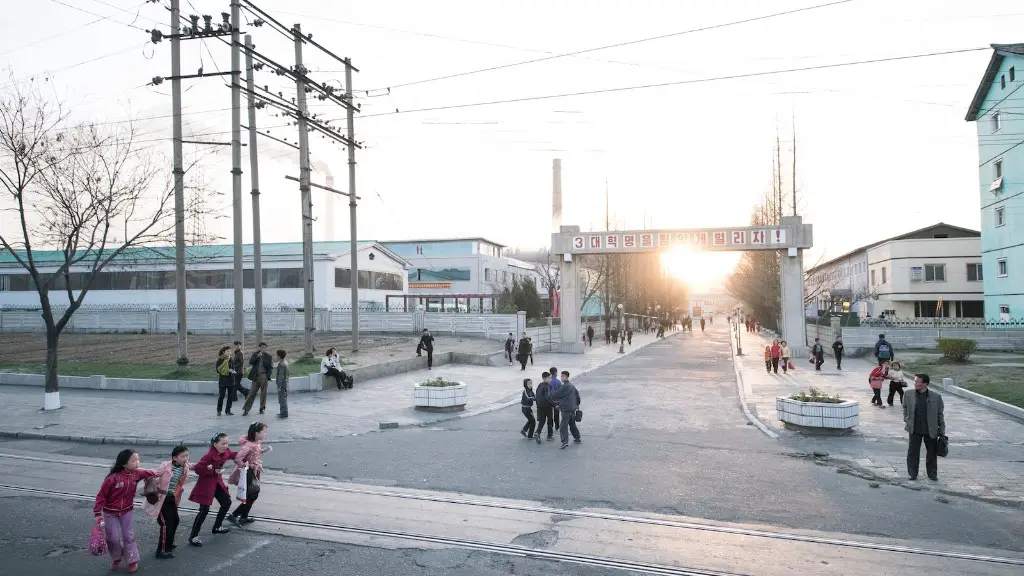The ongoing conflict between the United States and North Korea has been a major international issue for years. With both sides refusing to budge in negotiations, and tensions only increasing, the world must analyze how we got here and what can be done to solve this situation.
From North Korea’s perspective, the animosity towards the U.S. has been long-standing. In the 1950s, the U.S. conducted intensive airstrikes on North Korean territory resulting in the death of an estimated 3 million people. Since then, numerous provocations from the U.S. have forced the North Korean government to take drastic steps to prevent foreign interference in their internal affairs.
In recent years, the controversy has further escalated due to the nuclear ambitions of North Korean leader Kim Jong Un. The DPRK’s pursuit of nuclear weapons has been painted as a threat to international stability, and the U.S. has responded by imposing crippling economic sanctions targeting North Korea’s ability to obtain resources or trade.
However, the U.S. policy of isolation has proven largely ineffective. In fact, recent reports indicate that North Korea is rapidly advancing its nuclear capabilities, despite the tightening of UN sanctions.
Despite the seemingly intractable nature of the problem, some analysts suggest a different approach. Some experts argue that the U.S. should adopt a policy of détente, offering economic incentives and diplomatic outreach to encourage North Korea to engage in meaningful dialogue and reduce its reliance on nuclear devices.
Taking this approach would undoubtedly be a difficult endeavor. It would require the U.S. to come to the negotiating table with a different mindset, one that is willing to listen to the demands of North Korea and recognize their legitimate security needs. Furthermore, it would require the U.S. to suspend some of the more punishing measures of its sanctions, which could be viewed as a sign of weakness. And given the trust issues between the two sides, this could be an uphill battle.
Still, some believe that it is the only way forward. The U.S. and its allies must take a bold step to break through the decades of animosity and move towards a solution that will bring stability to the region. It is a daunting prospect, but with the right effort, it is not impossible.
What About Negotiations?
Negotiations between the U.S. and North Korea have been frozen since 2009. The lack of progress has been attributed to mistrust and a general unwillingness to compromise from both sides. Despite this, there have been a few attempts at re-engaging in dialogue, such as the proposed summit between Kim Jong Un and President Trump in 2018.
This summit ended in failure, as the two sides failed to reach an agreement, which many attributed to the unrealistic demands of the U.S. and North Korea’s reluctance to give up its nuclear program. Nevertheless, the mere fact that dialogue was attempted showed that there is a potential for negotiation and diplomacy.
Looking ahead, the U.S. must focus on building trust and pursuing a more reasonable approach. If it can demonstrate a commitment to seeing a peaceful resolution, then it might be able to forge a conversation that could eventually lead to a lasting peace.
Such a scenario will require patience and understanding—two qualities that unfortunately have been lacking in the past. But if the U.S. is willing to change its tactics, and North Korea is willing to listen, then there is hope for a resolution.
The Role of China and South Korea
China and South Korea have both become key players in the ongoing U.S.-North Korea conflict. China, in particular, has taken a more proactive role in seeking a resolution. This is due in part to the fact that it is North Korea’s largest trading partner and closest ally.
China has sought to facilitate negotiations between the U.S. and North Korea and has recently proposed a “double freeze” plan whereby North Korea would suspend its nuclear and missile programs while the U.S. and South Korea would suspend all joint military exercises. This plan has been met with mixed reactions, but it demonstrates China’s commitment to a diplomatic solution.
As for South Korea, it has sought to engage in meaningful dialogue with North Korea and has even proposed holding talks between the two countries. This has angered many in the U.S., who fear that any dialogue between the North and South could lead to lessening the U.S.’s influence on the peninsula.
Despite this, South Korea has been a vital partner in maintaining stability on the peninsula. It is clear that if the U.S. and North Korea are going to reach a resolution, South Korea’s involvement will be necessary.
Does Sanctions Work?
The United States has sought to use economic sanctions as a way to pressure North Korea into giving up its nuclear program. While there have been some successes from these sanctions, it is clear that they are not working as well as they could be.
With North Korea’s economy largely dependent on trades with China and other countries, the U.S. sanctions have been less effective than they could be. This is due to the fact that North Korea has been able to evade the sanctions by using its ally China to facilitate trade.
Furthermore, the sanctions have done little to alleviate the suffering of ordinary North Koreans, who have borne the brunt of the sanctions. This has made it difficult for the U.S. to win the hearts and minds of the North Korean people, which is a critical aspect of finding a peaceful resolution.
Given the ineffectiveness of the sanctions, it may be time for the U.S. to look for other ways to achieve its goals. Engaging in meaningful dialogue and taking a more conciliatory approach might be the best way forward.
The Humanitarian Angle
To truly understand the U.S.-North Korea conflict, it is important to consider the human element. The U.S. and its allies must not forget that beneath the headlines and political posturing is a country full of people who are just trying to survive and make a better life for themselves.
At present, the North Korean people are struggling to make ends meet due to economic hardship and the devastating effects of UN sanctions. It is clear that a peaceful resolution to the conflict is the only way to alleviate their suffering.
This means that any diplomatic solution must take into account the needs of the North Korean people. The U.S. and its allies must patiently listen and understand the issues at stake from their perspective.
Only then can the two sides find a resolution that is beneficial to both sides and, most importantly, to the North Korean people.
Rebuilding Relations
Any resolution to the U.S.-North Korea conflict will require a degree of trust-building between the two sides. At present, mistrust is rampant and there is a deep-seated resentment at play.
The U.S. and North Korea must work together to gradually rebuild the relationship between the two countries. This could involve more diplomatic exchanges, economic cooperation and cultural exchanges.
It is clear that trust-building will be no easy task. But if the two sides can make progress in this area, then there may be hope for a lasting and meaningful peace.
Military Aspects
Of course, a major factor in any resolution will be the U.S. military presence in the region. The U.S. and its allies have long maintained a robust military presence in the region, with U.S. troops stationed in South Korea, Japan and elsewhere in the region.
The U.S. has made it clear that it will not withdraw its forces until North Korea agrees to a verifiable denuclearization agreement. Nevertheless, the potential exists for the U.S. and North Korea to come to a mutually beneficial agreement in which both sides agree to reduce their military presence and ease tensions.
It is clear that the U.S. and North Korea still have many issues to work through before arriving at a lasting resolution. However, if both sides can come to the negotiating table with open minds and a spirit of cooperation, then there is hope that a solution can be found.





